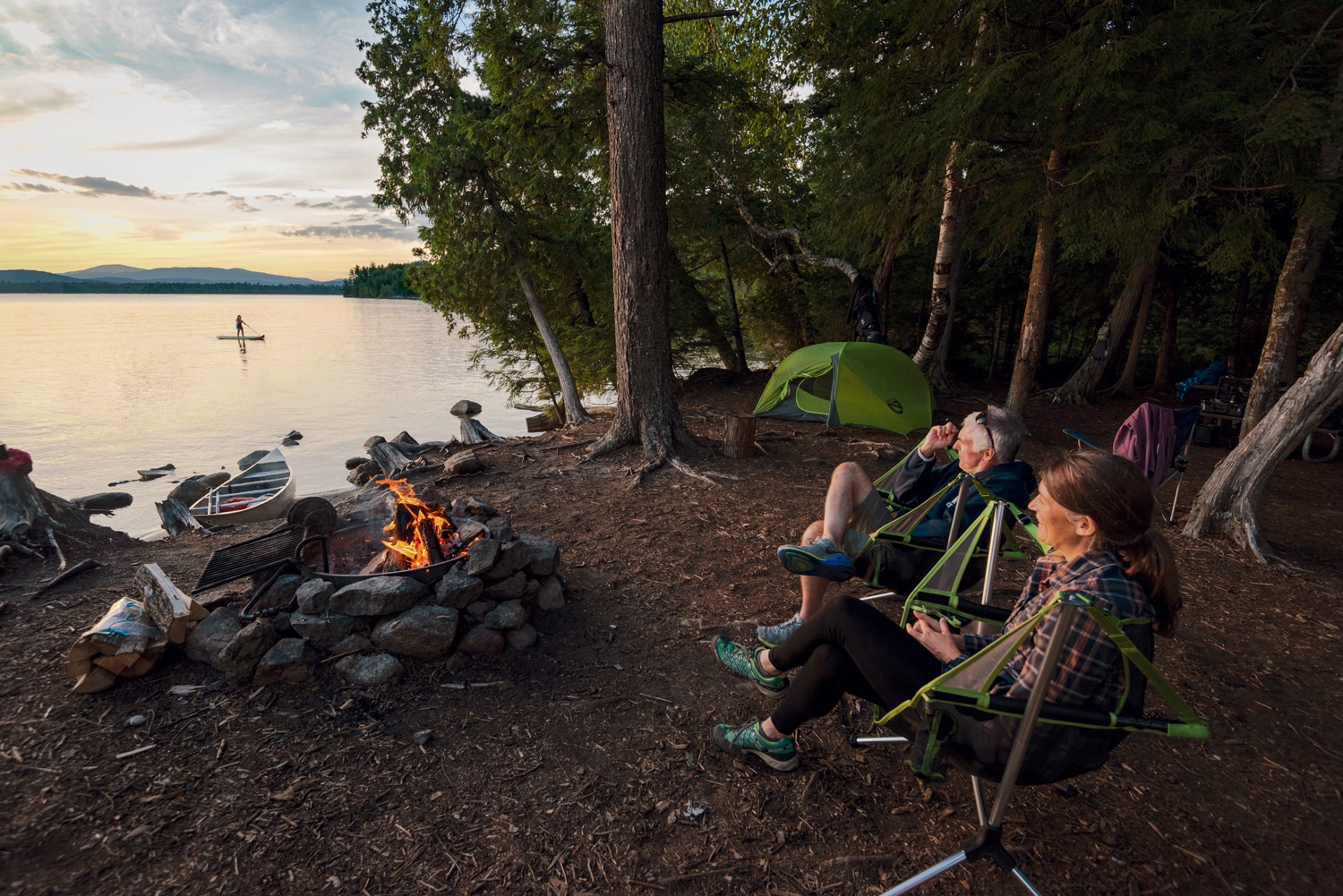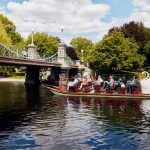34 Cool New England Camping Spots
Find inspiration for your next great outdoor getaway at these favorite New England camping spots.

Coffee By Design | Portland, Maine
Photo Credit : Katherine KeenanTent or RV? Lakeside, oceanfront, or backwoods? Whatever your preference, discover your next great nature getaway with our curated selection of noteworthy New England camping spots.
Lakeside New England Camping Spots
Aroostook State Park | Presque Isle, ME
Maine’s northernmost state park nestles along the shore of Echo Lake, five miles south of Presque Isle. It’s small, with just 30 sites for tents and RVs, but it boasts a beach, canoe and kayak rentals, showers, a kitchen shelter, and a trail leading to the twin peaks of Quaggy Jo Mountain and expansive views of “The County.” In winter, trails are groomed for cross-country skiing and snowshoeing. maine.gov/aroostook
Burlingame State Park | Charlestown, RI
Burlingame’s 700 tent sites and 20 cabins are gathered near the south shore of Watchaug Pond, one of Rhode Island’s largest bodies of freshwater. The park offers canoe rentals and access to trails lacing the adjacent Kimball Wildlife Sanctuary. For saltwater activities, it’s a short drive to three ocean beaches, including Westerly’s Misquamicut and Charlestown Beachway, renowned for surf casting. riparks.ri.gov/parks/camping
Button Bay State Park | Ferrisburgh, VT
Tucked along a hook of land on Lake Champlain and named for the pierced, buttonlike clay pebbles found on its beach, Button Bay has attractions both inside and outside its boundaries. A swimming pool, a nature center, and lakeside trails keep campers close to their tent and RV sites (lean-tos and four cabins are also available); nearby, there’s the fascinating Lake Champlain Maritime Museum and golfing at Basin Harbor Resort. vtstateparks.com/buttonbay.html
Lake Waramaug State Park | Kent, CT
Connecticut’s second-largest natural lake is a jewel of the Litchfield Hills, and this state park offers the only campsites along its shores. Many of the 76 tent and RV sites and six rustic cabins overlook the lake, named “place of good fishing” by the native Wyantenock. The name still rings true for bass anglers, who can rent canoes and kayaks at the park. Other recreational opportunities include an eight-mile bicycle circuit around the lake. ctparks.com/park-finder
North Beach Campground | Burlington, VT
In most states, camping in their largest city isn’t a top vacation draw. But Burlington’s North Beach is far from downtown’s bustle, and its 137 sites—some with full hookups for RVs, others accommodating tent campers—enjoy a parklike setting along a sandy Lake Champlain beach. Bring a bike for an easy ride on the Burlington Greenway, then settle in at the lake’s edge to watch the sun set over the Adirondacks. enjoyburlington.com/north-beach-campground
Sebago Lake State Park | Casco and Naples, ME
The northeast side of Maine’s second-largest lake, a scant hour’s drive from Portland, is the locale for a 1,400-acre state park featuring 250 campsites, sandy beaches, meandering forest trails, and boat launches. Glacially gouged and more than 300 feet deep, Sebago harbors two of the state’s premier freshwater game fishes—landlocked salmon and lake trout, locally known as togue—along with a dozen other species. maine.gov/sebagolake
Tully Lake Campground | Royalston, MA
Island-strewn Tully Lake and its surroundings make for a classic, quiet, tents-only camping destination. The 200-acre lake, created in 1966 as a flood-control project, is ideal for paddlers, as powerboats are limited to 10hp. Most of the 35 campsites are accessible only by foot, with carts available at the entrance. Canoes and kayaks are available for rent, and the 7.5-mile trail circling nearby Long Pond is popular for hiking and mountain biking. thetrustees.org/tully
White Lake State Park | Tamworth, NH
It isn’t a big body of water—the circling footpath is only two miles long—but this glacial lake 20 miles from North Conway has a following among swimmers and trout anglers. It’s also a favorite with New Hampshire’s treasured loons. Nearly 200 wooded tent and RV sites are divided into two sections, each with distinct advantages: Area 2 is closer to the beach, while Area 1 contains 19 nonreservable sites. nhstateparks.org/find-parks-trails
Oceanside New England Camping Spots
Cobscook Bay State Park | Edmunds, ME
The bay named “boiling tides” by the Passamaquoddy is about as Down East as it gets. Surrounded on three sides by water with an average tidal range of 28 feet, Cobscook has special allure for birders, as some 200 species—including Maine’s greatest concentration of bald eagles—are attracted to the abundance of protein that the tides provide. With 106 sites, the 888-acre park welcomes both tent and RV campers. maine.gov/cobscookbay
Fishermen’s Memorial State Campground | Narragansett, RI
Ideally located within a short drive of three state beaches—Roger Wheeler, Scarborough, and Salty Brine—and just a mile from the Block Island ferry dock, this popular campground near the tip of Point Judith features 147 trailer and RV sites, plus 35 sites for tenting. A special attraction is the nearby Galilee Bird Sanctuary, a 130-acre salt marsh breeding ground for sharp-tailed sparrows, willets, plovers, and many other avian species. riparks.ri.gov/campgrounds
Hammonasset Beach State Park | Madison, CT
Connecticut’s biggest and most visited beach is a gentle two-mile arc of sand on a peninsula reaching into Long Island Sound. The eight cabins and 550 tent and RV campsites located slightly inland provide easy access to swimming and surf casting, launching spots for kayaks and small boats, and a three-quarter-mile beach boardwalk. Campers can explore the park’s Meigs Point Nature Center, with touch tanks and information on birding trails. ctparks.com/park-finder
Rocky Neck State Park | Niantic, CT
With a tidal river on one side, a salt marsh on the other, and frontage on Long Island Sound, Rocky Neck is New England’s oceanfront diversity in a nutshell. Accommodations include 160 tent and RV sites and three rustic two-room cabins. The stone-free white sand beach, five miles of hiking trails, paved bike paths, and marsh viewing platforms for birders provide a varied camping experience. ctparks.com/park-finder
Sandy Neck Beach Park | West Barnstable, MA
There’s only one place on Cape Cod’s beaches where it’s legal to pitch a tent. That’s Sandy Neck, where the town of Barnstable has set aside a park on a pristine stretch of bayside barrier beach. While most overnighters stay on the beach in their own permitted, self-contained campers capable of driving on the sand, there are five tent sites within a quarter mile of the bay (be prepared to walk, though, as those sites are more than three miles from the park entrance). town.barnstable.ma.us/sandyneckpark
Schoodic Woods Campground | Acadia National Park, ME
Of the four campgrounds in Acadia National Park, Schoodic Woods is the newest—and the farthest from Bar Harbor, about a one-hour drive away. Unless that town is a priority destination, though, this is a great option for campers preferring the more tranquil Schoodic Peninsula to busy Mount Desert Island. Of the 89 campsites, 41 are reserved for RVs and 13 for tent campers, with nine secluded spots accessible only by hiking or boating in. nps.gov/acadia
Wolfe’s Neck Oceanfront Camping | Freeport, ME
A mere five miles from downtown Freeport, yet serene in its own 600-acre-plus waterside world, Wolfe’s Neck has tent and RV sites, along with three well-equipped cabins. There are hiking trails, bikes and kayaks for rent, a café serving light meals made with organic produce, and the chance for kids to help with gardening and animal care at farm camp. freeportcamping.com
New England RV Camping Spots
Ashaway RV Resort | Bradford, RI
One of two Zeman RV Resorts locations in New England (the other is in Kennebunk, Maine), Ashaway is close to beaches, Watch Hill, and Napatree Point, as well as Connecticut’s Foxwoods Casino. But there are plenty of reasons to stay put, including a pool, mini golf, an arcade, and courts for tennis, pickleball, and basketball. RV sites offer full hookups and cable; nicely outfitted cottages are available, too. zemanrv.com/resorts/ashaway-pines-rv-resort
Cannon Mountain RV Park (Franconia Notch State Park) | Franconia, NH
On the other end of the spectrum from giant RV parks, this tiny state park facility has just seven spaces but boasts a splendid location near the beaches of Echo Lake and the ski trails of Cannon Mountain. Plus, it’s open all year—and despite its small size, it offers water, sewer, and electric hookups in summer and early fall. No pets are allowed, and early reservations are a must. nhstateparks.org/find-parks-trails
Hampton Beach State Park | Hampton, NH
There’s another, lesser-known lottery in New Hampshire—the one that parcels out reservations for the 28 coveted RV campsites at Hampton Beach State Park. The smallest campground for RVers on New England’s shortest state coastline, it’s located just south of Hampton Beach and offers easy access to the historic cities of Portsmouth and Newburyport. The sites are all RV—no tents—and are open to vehicles that can connect to water, electric, and sewage hookups. nhstateparks.org/find-parks-trails
Normandy Farms Family Camping Resort | Foxboro, MA
The accent here is on “resort.” Normandy Farms is like a big outdoor hotel, set on a 100-acre site that accommodates more than 350 RVs. Alternatively, guests can lodge in luxuriously equipped cabins and yurts, or in safari tents and pop-up campers. There are indoor and outdoor pools, sports fields for just about everything that involves a ball, a bike park, disc golf, and even yoga classes and massages at the wellness center. normandyfarms.com
Pine Lake RV Resort and Cottages | Sturbridge, MA
Sociability and community spirit are bywords at this central Massachusetts park, just minutes from Old Sturbridge Village. Barbecues, “meet your neighbor” happy hours, hayrides, and movie nights—it’s hard not to make new friends here. Pine Lake has a beach and good fishing; kayaks and paddleboards are available for rent. Rainy day? Stay inside at the fitness center or billiard room. Studio and one- and two-bedroom cottages supplement 200 RV sites. pinelakervresortandcottages.com
Sugar Ridge RV Village | Danville, VT
There are RV mega-resorts, and then there’s Sugar Hill: a laid-back, 150-site property amid 68 acres of woodland. Choose from sites ranging from no hookups to the works; all come with use of two pools, a fishing pond, 18-hole mini golf, and sports courts including horseshoes (perhaps using the footwear from the big Belgians that pull the wagon rides). Nearby attractions include the St. Johnsbury Athenaeum and the Fairbanks Museum & Planetarium. sugarridgervpark.com
Boat-In New England Camping Spots
Burton Island State Park | St. Albans, VT
Burton Island is only 10 minutes by ferry from the mainland’s Kill Kare State Park, but there’s an international feel to this island destination in northern Lake Champlain. That’s because its 100-slip marina is popular with boaters from Quebec, as well as stateside voyagers. Along with tent sites, lean-tos, three cabins, and hiking trails, 253-acre Burton boasts a bistro serving breakfast and lunch. Those tasty omelets might just be part of the international appeal. vtstateparks.com/burton.html
Green River Reservoir State Park | Hyde Park, VT
Green River Reservoir’s clear waters and 19 miles of undeveloped wooded shoreline have been attracting paddlers, wilderness campers, and anglers seeking bass and pike since long before being protected within a state park. A launch site for canoes and kayaks is the starting point for reaching 27 remote tent sites, some two miles distant. Powerboats and Jet Skis are prohibited; nesting loons approve. vtstateparks.com/grriver.html
Knight Island State Park | North Hero, VT
Two miles offshore from the town of North Hero and light-years from the outside world, the six lean-tos and single tent site on this wooded island in Lake Champlain’s Inland Sea are accessible only by private boat or water taxi. The shoreline sites have composting outhouses, though no potable water. Kayakers and canoeists can arrange parking at Hero’s Welcome General Store in North Hero. vtstateparks.com/knightisland.html
Peddocks Island | Hull, MA
Stars twinkle over many a campsite, but campers here get to see the sparkle of the Boston skyline, eight miles away. Part of Boston Harbor Islands National and State Park, Peddocks offers furnished yurts with electricity, as well as individual and group tent sites. Trails link campsites with the remains of Fort Andrews, active through World War II. Access is by a three-mile ferry ride from Hingham. bostonharborislands.org
Three Mile Island Camp | Lake Winnipesaukee, NH
Since 1900, the Appalachian Mountain Club has made a home away from its Boston home on a 43-acre island in New Hampshire’s largest lake. You don’t have to be an AMC member to reserve one of 47 lakeside cabins, equipped with simple furnishings, bedding, and solar shower; each has its own dock for private craft, or you can arrive by camp launch. Campers enjoy three hearty meals a day in the main house. threemileislandcamp.org
Umbagog Lake State Park | Errol, NH
Loons seem to call louder at lakeside camps accessible only by boat. Way up on the New Hampshire–Maine border, Umbagog features 33 remote tent sites and four remote cabins, all well away from the main, hookup-equipped sites and reached by canoe, kayak, or, by arrangement, the park’s motorboat. For real isolation, reserve the site on Sunday Cove Island, situated in a cove near the 11-mile-long lake’s northeast corner. nhstateparks.org/find-parks-trails
Warren Island State Park | Isleboro, ME
If island camping seems too tame, try camping on an island off an island. Warren Island is a stone’s throw from Isleboro, which lies three miles out in Penobscot Bay. Ferry to Isleboro, then kayak to the park; there are limited moorings for larger craft. (Don’t have a boat? There’s water taxi service, too.) Among the spruces are 12 tent sites and three lean-tos, and a hand pump for water. A ranger sells firewood. maine.gov/warrenisland
New England Camping Spots With Trail-Access
Baxter State Park | Millinocket, ME
Baxter State Park isn’t a camping destination with hiking trails—it’s a 210,000-acre hiking destination with campgrounds. The northern terminus of the Appalachian Trail, this sprawling park is threaded with 215 miles of wilderness footpaths organized into 10 trail systems, including the AT itself and trails that ascend 5,269-foot Mount Katahdin and its fabled Knife Edge. Camping facilities range from tent sites to lean-tos, cabins, and shared bunkhouses. baxterstatepark.org
Dolly Copp Campground | Gorham, NH
For many who come to tackle the peaks of the Presidential and Carter-Moriah ranges, the camp of choice has long been Dolly Copp. The 177-site campground, largest in the White Mountain National Forest, is a starting point for the 3½-mile Daniel Webster Scout Trail leading to Mount Madison via the Great Gulf Wilderness. Not a hiker? Stay close to camp and fish for brook trout on the Peabody River and Culhane Brook. recreation.gov
Dry River Campground (Crawford Notch State Park) | Bartlett, NH
Vast Crawford Notch State Park has just one campground: Dry River, with 36 spacious, wooded tent sites. Located off Route 302 near the Appalachian Mountain Club’s Highland Center, it’s popular with hikers setting out on White Mountains footpaths including the easy Ripley Falls Trail, leading to a spectacular 100-foot waterfall; the Willey Pond/Saco River Loop; and the more challenging trail to dramatic Frankenstein Cliff. nhstateparks.org/find-parks-trails
George Washington Memorial Camping Area | Chepachet, RI
No, George Washington didn’t sleep here. But if he showed up today with a tent or RV, he’d find an especially peaceful retreat in a scenic, lightly used primitive campground tucked into his namesake 4,000-acre state wildlife management area. Twelve of the 76 sites are hike-in only, and four cabins are available. Swim, fish, and kayak at the adjacent Bowdish Reservoir. riparks.ri.gov/campgrounds
Savoy Mountain State Forest | Florida, MA
Covering more than 10,000 acres in northwestern Massachusetts’s Hoosac Mountains, Savoy is crisscrossed with some 50 miles of trails. Favorite routes lead to Bog Pond, with its floating peat islands and carnivorous pitcher plants; Tannery Falls, plunging more than 60 feet; and the summit of Spruce Mountain, with its expansive views of the surrounding countryside. Campers can choose from 45 tent sites and four woodstove-equipped log cabins overlooking South Pond. mass.gov/locations/savoy-mountain-state-forest
Smugglers’ Notch State Park | Stowe, VT
Ideally situated where Vermont’s twistiest mountain roadway and the famed Long Trail meet, this is a hiker’s park. Climb the steep, one-mile trail to Sterling Pond (at 3,000 feet, it’s one of the state’s loftiest bodies of water), take an easier trek to beautiful Bingham Falls, or follow the Long Trail itself for breathtaking vistas at the summit of Mount Mansfield. Twenty tent sites and 14 lean-tos are available for overnighters. vtstateparks.com/smugglers.html







